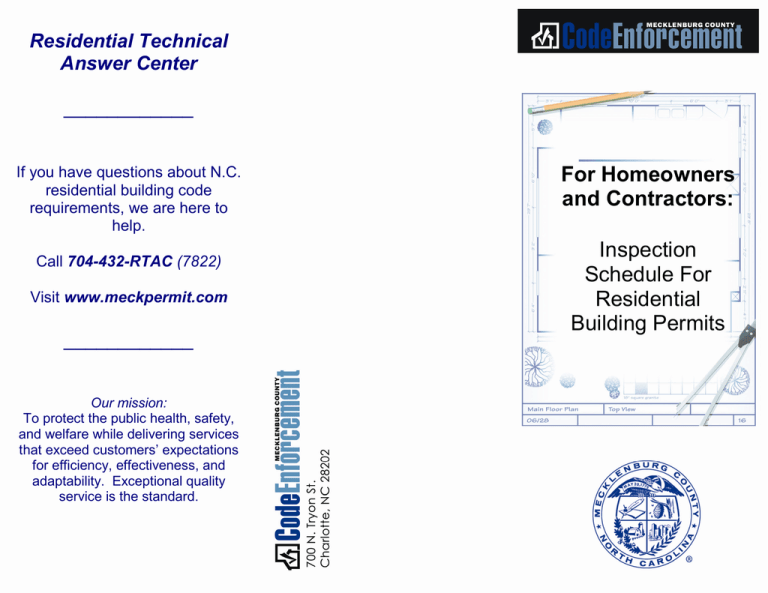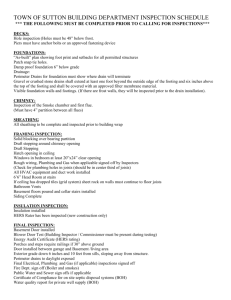For Homeowners and Contractors: Inspection
advertisement

Residential Technical Answer Center ____________ If you have questions about N.C. residential building code requirements, we are here to help. Call 704-432-RTAC (7822) Visit www.meckpermit.com ____________ Our mission: To protect the public health, safety, and welfare while delivering services that exceed customers’ expectations for efficiency, effectiveness, and adaptability. Exceptional quality service is the standard. For Homeowners and Contractors: Inspection Schedule For Residential Building Permits INSPECTIONS The work being scheduled for inspection shall be ready at the time the inspection request is made. All necessary plans shall be on site for the inspector. All pertinent information shall be included on the plans including truss design and layout sheets, summary reaction sheet, I-joist layout and LVL beam specifications if applicable. The following is an outline of the different types of inspections the County provides and a schedule of when they are to be performed throughout the construction process as required by the North Carolina State Building Code. 1. Footing Inspection: To be scheduled after the trenches are excavated, all grade stakes are installed, all reinforcing steel and supports are in place and appropriately tied, all necessary forms and bulkheads are in place and braced, but before any concrete is placed. All filled building lots require a Subgrade Verification Form. Footer width is measured at the base of the trench and should be at least 12” below grade at the time of the inspection. 2. Under Slab Inspection for Habitable Spaces, Garages, Carports and Porches: To be scheduled after all forms have been placed, all electrical, plumbing and/or heating and air conditioning facilities in place, all crushed stone, vapor retarder, reinforcing steel with supports and ties, and all welded wire fabric is installed, when required. All thickened areas and grade beams must be installed. Verification of termite treatment and methods used are required at this time. Exception: An inspection is not required for driveway slabs, patio slabs, walks, etc. which are considered non-habitable spaces. 3. Foundation Inspection: To be scheduled after all foundation supports or piers are installed and prior to backfill. This inspection is to check the size of the footings and the placement of the foundation wall on the footings, the foundation itself, the anchor bolts or straps and the ground clearance. The crawl space leveling, backfilling and positive drainage will be inspected with the framing inspection. Insulation shall not be installed on the foundation walls (closed crawl space) or floor systems installed prior to foundation inspection. Damproofing and waterproofing are not part of the foundation inspection but are a code requirement in some foundation designs. 4. Rough-in Inspection: Plumbing, Mechanical and Electrical To be scheduled when all framing is complete and the building is dried in (roofing felt or shingles in place). All parts of the plumbing, mechanical and electrical system which will be hidden from view in the finished building must be complete and ready for inspection. 5. Building Framing Inspection: To be scheduled after the roof, wall, ceiling and floor framing is complete with appropriate blocking, bracing and fire stopping in place. The following items should be in place and visible for inspection: · Insulation baffles when required · Chimneys, vents, flashing for roofs and wall openings · All trade rough-ins must be complete. Windows and exterior passage doors should be installed and flashed · Building wrap should be installed if it is required by the type of siding to be used · Siding cannot be installed before the sheathing is inspected. OPTIONAL: A sheathing inspection, for an additional fee, can be requested prior to a full frame inspection to allow exterior wall coverings to be installed. All exterior components will be inspected. · All brick lintels that are required to be bolted to the framing for support shall be in place. Lintels that are supported by brick or masonry as it is installed will be inspected at a later date. · All penetrations in wall plates must be firestopped. Crawl space penetrations must be caulked to prevent air movement. 6. Insulation Inspection: To be scheduled after the building framing and trade rough-in inspections are complete. All wall insulation must be in place. Chimney insulation must be properly secured to prevent contact with the firebox. Blown in attic insulation and crawl space insulation should be installed after dry wall and inspected with the final inspection. Depth markers for blown in attic insulation are required. 7. Final Inspections: Final inspections should be made for each trade after completion of the work authorized under the technical codes. All projects shall be accessible for inspection between 8:00 am and 5:00 pm, Monday through Friday except by appointment. The project is not finished until all finals are complete. A building final is required before utility services will connect. Floor coverings are not required to be installed for any final inspections. Rough grades must be complete and all driveways, walks and patios must be in. Permanent addresses shall be posted on all new dwellings. 8. Other Inspections: In addition to the called inspections above, the inspection department may make or require any other inspections to ascertain compliance with the Building Code and other laws enforced by the Inspections Department.

